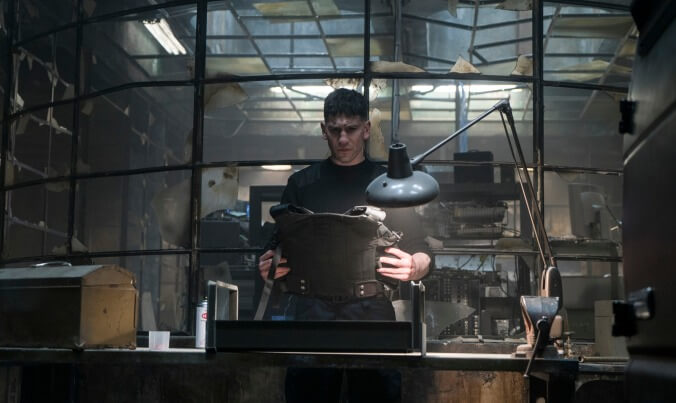The Punisher avoids being exploitative, but stumbles anyway

One of the primary concerns ahead of the premiere of Marvel’s The Punisher was that it would glorify violence at a time when mass shootings are a near-daily occurrence in this country. Fortunately, those fears quickly dissipate within minutes of the series premiere, which, despite finding Frank Castle, a.k.a the Punisher (Jon Bernthal), in his heavily armed milieu, soon steers away from the battlefield and into a life of not-so-quiet reflection. The opening credits might make the questionable if apt choice of assembling a skull logo from semiautomatic weapons, but the first six episodes form a thoughtful look at the toll brutality takes on its victims—and agents.
The series picks up at the end of Frank’s original campaign to bring his family’s killers to justice after the speediest (read: nonexistent) of trials. That job done, he retreats to a job in demolition, where in moments as heavy-handed as his sledgehammer-wielding arms, the former Marine tears down walls to get back to his humanity. It’s a rote first act—Frank even tells his starry-eyed co-worker that he’s not looking for friendship—until the violent capper. We already have the backstory, but here, we see shades of gray in the Punisher’s morality, as he spares an ex-con caught up in crime again because he’d gotten to know the guy first.
That shift is among the key elements that prevent The Punisher from being dour or grueling, which was a distinct possibility even outside of the context of the current state of gun control. There’s lots of grit, sweat, and, yes, blood, but this isn’t just a continuation of his grim mission from Daredevil season two. Thanks to Bernthal’s raw and wide-ranging performance in his introduction, the small-screen Punisher has always had nuance (and charm, especially in that diner scene with Deborah Ann Woll’s Karen Page). Showrunner Steve Lightfoot wisely adds more layers to his antihero protagonist, who’s of a piece with the reluctant gunslingers of old Westerns. He finds friends (or at the very least, partners) new and old, including fellow vets Curtis Hoyle (Jason R. Moore) and Billy Russo (Ben Barnes), as well as David Lieberman (Ebon Moss-Bachrach), a whistle-blowing hacker who goes by the name Micro (because Microchips are so last century). And Bernthal continues to look as at home in terrible flashes of anger as he does caring for children.
Still, The Punisher never lets us forget that this is a man who lived by the sword long before he was out for vengeance. When not swinging a hammer or brooding in silence, Frank is wracked by his PTSD, a by-product of his two tours of duty, as well as the soul-shattering loss of his family. His family life and military service are revisited in many flashbacks, allowing us to see how Frank’s fatherhood instincts played out at home and in the field. More tender moments are juxtaposed with chilling examples of just how skilled and unquestioning Frank was in his job, complicating matters of personal accountability and audience sympathy.
Like its protagonist, The Punisher isn’t looking to let anyone off the hook. Rather than hold Frank up as a lone wolf, the series explores the relationship between violence and righteousness, as well as order and chaos. To the latter point, it presents a theory similar to that espoused by The Dark Knight’s Joker—when the “right” people suffer or die, their misfortunes don’t create many ripples. But there’s no simple us-vs.-them dichotomy here; the combatants change all the time. First, they’re Afghani fighters, then Iraqi rebels, but it’s not long before servicemen are seen as a threat or expendable. The series treats the government’s negligence as an attack on these veterans. Leaving them without a support network creates an ever-hostile environment—it’s like they never left combat.
But although The Punisher could be the most ambitious of the Marvel Cinematic Universe shows, with its unflinching exploration of grief, anger, and trauma, the series still feels awfully up in the air at the midseason mark. It can’t quite evade the same roadblocks that have popped up in other overlong comic book adaptations, like having more time than plot. The ratio isn’t quite the same here, because there’s actually an abundance of storylines: a cover-up wrapped in a conspiracy; a tense standoff turned partnership; betrayal couched in friendship. But because there are so many angles to pursue, the story ends up stretched thin again. There’s some redundancy with MCU repertory player Karen Page and new “widow” Sarah Lieberman (Jaime Ray Newman), who are both positioned as characters who could help Frank move on. Woll and Bernthal’s great chemistry prevent Karen’s inclusion from feeling like The Punisher adhering to a corporate mandate, but that just makes it harder to justify Frank and Sarah’s frequent interactions. The peace between bullet-spraying action sequences is welcome, but Frank playing family man just slams the brakes on the story.
It’s hard to say how much of this ground will be recovered in the latter half, which is where virtually every other Marvel show loses its way. But The Punisher looks like it could buck that trend precisely because it doesn’t look or feel like any other show in the small-screen MCU. Even though there are lighter moments, the spin-off avoids maintaining a humorous tone while also restricting how much it bleeds into the world of the companion shows. It’s meditative but not self-flagellating; brutal but not a slog. It remains to be seen how it will stack up to the Defenders and their individual outings, but at the very least The Punisher could nab the title of first stand-alone property in all of the MCU, TV or film.